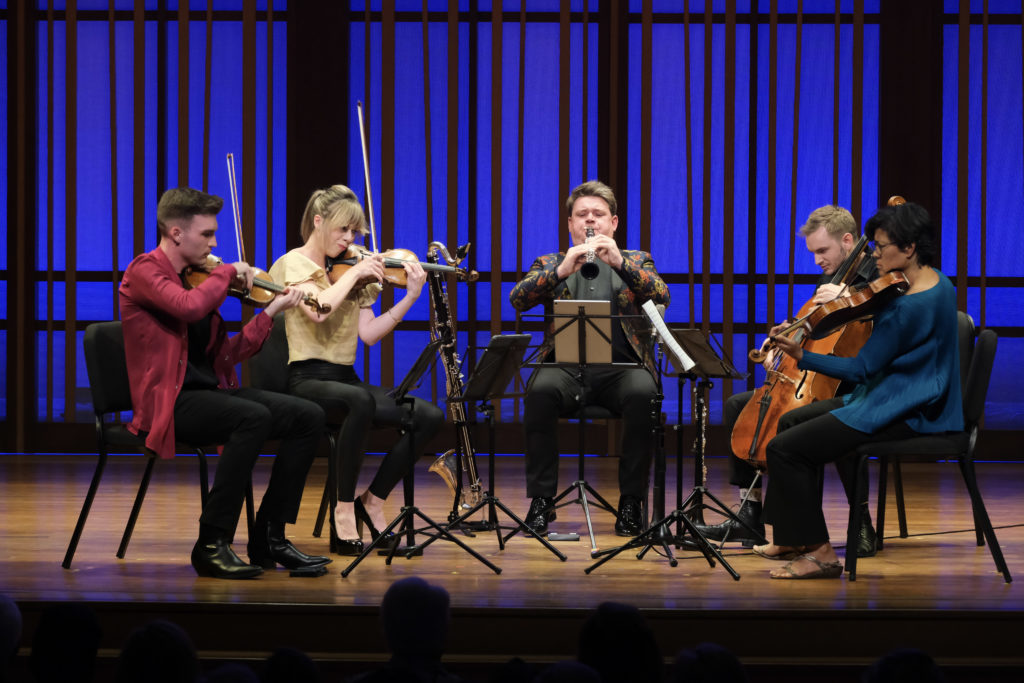Spiritual Traditions Inspire the Offerings of SummerFest’s Friday Concert
Each of the three works on Friday’s intriguing SummerFest program is rooted in a distinct spiritual tradition. The opening instrumental trio for two violins and cello is an arrangement of J. S. Bach’s organ chorale prelude “Wachet auf, ruft uns die Stimme,” BWV 645, and is based on a traditional chorale by the German Lutheran theologian Philipp Nicolai. This chorale is traditionally sung in Lutheran churches on the Sunday before the beginning of Advent.
The finale of Felix Mendelssohn’s Piano Trio No. 2 in C Minor, Op. 66, presents and elaborates the Calvinist Psalm Tune known as “Old Hundredth” written by the foremost French Reformed composer Louis Bourgeois and is sung as the Doxology in Protestant churches around the globe.

(l. to r.) Alexi Kenney, Tessa Lark, Mark Simpson, Coleman Itzkoff & Maiya Papach [photo (c.) Ken Jacques
The 1994 Dreams and Prayers of Isaac the Blind is one of Golijov’s most successful works, and SummerFest’s quintet of musicians featuring clarinet virtuoso Mark Simpson in the crucial solo role clearly impressed Friday’s audience at the Conrad Prebys Performing Arts Center. Golijov asks much of the clarinetist: at times he is the composer’s pious great-grandfather praying with his phylacteries in the early morning light and at other times he is a blazing klezmer musician inciting inebriated party-goers to dance wildly late into the night.
Using the customary B-flat clarinet as well as a clarinet in A and the huge bass clarinet, Simpson rose to Golijov’s challenge gloriously, capturing the composer’s extreme emotional expectations with the gamut of his instruments’ colors, from the warmest Brahmsian melodies to piercing shrieks of klezmer ecstasy. At every turn, the festival string quartet supported him eloquently. Kudos to first violinist Alexi Kenney, who successfully engaged with Simpson in complex cantillation at very quiet dynamic levels, and to cellist Coleman Itzkoff whose radiant pedal tones deepened the awe of Isaac’s spiritual trances.
To laud the sophistication of Mendelssohn’s piano trios is as redundant as praising water for being wet, and festival Music Director Inon Barnatan found performers who delivered Mendelssohn’s mellifluous themes and elaborate structures with consummate ease. The young Hungarian pianist Zoltán Fejérvári impressed La Jolla Music Society patrons with his astounding solo recital in January of 2022, and his return to the Conrad in Mendelssohn’s Second Piano Trio reminded us how transporting his musicianship can be, especially his complete assurance delivering the composer’s most dazzling arpeggiated figurations at breathtaking tempos. Violinist Blake Pouliot and cellist Efe Baltacigli matched his finesse and complemented his fire, notably with their dulcet duet in the piano trio’s only calm movement, the “Andante espressivo.”
Violinists Tessa Lark and Alexi Kenney effortlessly tossed J. S. Bach’s nimble counterpoint back and forth in the “Wachet auf” chorale prelude, while cellist Efe Baltacigil supplied his aptly restrained pizzicato bass line.
This concert was presented by the La Jolla Music Society on Friday, August 4, 2023, in La Jolla’s Conrad Prebys Performing Arts Center.

Ken Herman, a classically trained pianist and organist, has covered music for the San Diego Union, the Los Angeles Times’ San Diego Edition, and for sandiego.com. He has won numerous awards, including first place for Live Performance and Opera Reviews in the 2017, the 2018, and the 2019 Excellence in Journalism Awards competition held by the San Diego Press Club. A Chicago native, he came to San Diego to pursue a graduate degree and stayed.Read more…
